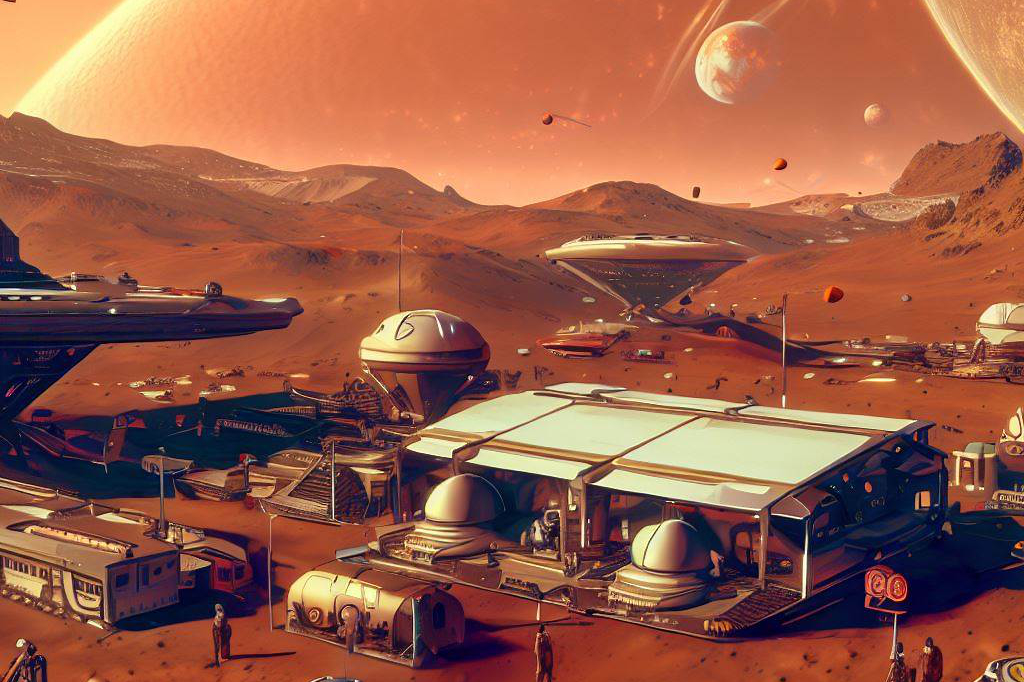Colonization, an age-old concept rooted in the thirst for exploration and expansion, holds a diverse tapestry of historical significance. From the ancient Greeks establishing colonies across the Mediterranean to European powers setting foot on distant shores during the Age of Discovery, colonization has shaped civilizations and reshaped territories. Yet, as humanity looks towards the vast expanse of space with renewed curiosity and ambition, a new form of colonization emerges—one that extends beyond our home planet.
The Definition and Historical Context of Colonization
Colonization can be defined as the act of establishing a settlement or society in a previously uninhabited or sparsely populated area by people from another region or country. Throughout history, colonization has often been driven by various motivations, such as expanding empires, acquiring resources, religious zeal, or seeking new economic opportunities.
The motives have evolved over time but have remained rooted in human curiosity and the desire for exploration. The historical context portrays colonization as both beneficial and problematic.
On the one hand, it has led to cultural exchange and economic growth when executed with cooperation and respect. However, it has also resulted in conflict, exploitation, and social inequalities due to power dynamics between colonizers and indigenous populations.
Current State of Space Exploration

In recent decades, humanity’s fascination with space exploration has reached unprecedented heights. Advancements in technology have catapulted us beyond Earth’s atmosphere on numerous missions to better understand our celestial surroundings.
The endeavors conducted by national space agencies like
- NASA (National Aeronautics and Space Administration),
- ESA (European Space Agency),
- Roscosmos (Russian Federal Space Agency), (blocked from Google, at time of writing)
along with contributions from private companies like SpaceX, have propelled us towards realizing the possibility of colonizing other planets. While we have yet to establish permanent settlements beyond Earth’s boundaries, substantial progress has been made.
Astronauts have visited the Moon during NASA’s Apollo missions, space probes have explored nearby planets such as Mars and Venus, and the International Space Station (ISS) orbits Earth as a symbol of international collaboration in space exploration. These achievements serve as stepping stones towards the ultimate goal of colonizing other celestial bodies.
The Economic Impacts of Potential Colonization
The prospect of colonizing other planets holds immense potential for unleashing significant economic impacts on both Earth and the colonized celestial bodies. As humans venture beyond our homeworld, we enter uncharted territory with potential benefits waiting to be harnessed. These impacts extend beyond mere scientific exploration; they delve into economic opportunities that could revolutionize industries, alter trade dynamics, and shape the destiny of humanity’s future.
In the following sections, we will explore the multifaceted economic benefits that colonization could bring to Earth. We will delve into technological advancements and innovations arising from space exploration efforts, job creation opportunities within the aerospace industry, and the potential utilization of extraterrestrial resources, leading to unprecedented resource exploitation and interplanetary trade routes.
Additionally, we will also examine how colonization would impact the economies of newly inhabited planets or moons—what infrastructural developments might be necessary, and how these environments could foster growth. By analyzing these aspects comprehensively in later sections, we seek to shed light on the far-reaching consequences that colonization holds for our society—not just in terms of scientific curiosity but also in terms of economic progress and prosperity for both Earth and those brave enough to embark on interplanetary journeys.
Technological Advancements and Innovation

In the quest for colonizing other planets, one of the most significant economic benefits for Earth lies in the realm of technological advancements and innovation. The very act of venturing beyond our home planet necessitates cutting-edge research and development in space technology.
Governments, private companies, and international collaborations allocate substantial resources to exploring extraterrestrial frontiers. This influx of funding triggers a cascade of breakthroughs that reverberate across various industries on Earth.
Investment in space technology research and development plays a pivotal role in driving innovation. The pursuit of colonization demands novel solutions to overcome challenges such as long-duration space travel, sustainable habitation structures, efficient resource management, and propulsion systems.
These demands stimulate collaboration between scientists, engineers, and researchers from diverse disciplines, fostering cross-pollination of ideas. Moreover, investments made in space technology often result in unforeseen spin-off technologies that have practical applications on Earth.
Take telecommunications as an example; satellite communication systems developed for space exploration have revolutionized global connectivity by enabling long-distance communication with remote regions. Similarly, materials science advancements aimed at improving spacecraft durability find applications in automotive manufacturing or the construction industries.
Job Creation and Economic Growth
The potential colonization of other planets brings with it a surge in job creation opportunities that can stimulate economic growth on Earth. As the aerospace industry expands to support ambitious space exploration missions, numerous new positions emerge across various sectors. The establishment of colonies beyond our planet creates a demand for skilled professionals specializing in fields such as
- astronautics,
- robotics engineering,
- astrobiology,
- environmental sciences,
- terraforming technologies
—the list goes on.
This expansion leads to increased employment opportunities not only within the aerospace industry but also indirectly through supporting sectors like manufacturing (e.g., spacecraft production) or tourism (e.g., space travel experiences). Furthermore, the heightened interest in space exploration generates a spillover effect on related sectors.
Increased public and private investment in space initiatives stimulates research institutions and universities to expand their programs, fostering a new generation of scientists and engineers. This influx of talent augments Earth’s intellectual capital, which can lead to further scientific advancements and economic opportunities.
Resource Exploitation and Trade Opportunities

The prospect of colonizing other planets also opens up possibilities for resource exploitation and interplanetary trade, presenting significant economic implications for Earth. The challenges associated with sustaining life on distant planets or moons necessitate self-sufficiency in terms of resources. Extraterrestrial bodies like the Moon, Mars, or asteroids are believed to harbor valuable resources such as minerals, water ice, or rare metals.
Utilizing these resources for Earth’s industries reduces reliance on terrestrial reserves while minimizing the environmental impact caused by extraction activities on our planet. Moreover, the potential establishment of interplanetary trade routes presents an intriguing avenue for economic growth.
As colonization efforts progress and infrastructure develops on other celestial bodies, trade networks could be established between different colonies and Earth. Just as maritime routes connected nations during the Age of Exploration, interplanetary trade could foster cooperation between planetary settlements by exchanging goods, technology blueprints, and scientific knowledge—ultimately driving economic prosperity across space-faring civilizations.
Economic Impacts on Colonized Planets/Moons

Infrastructure Development: Building the Foundation for Colonization
As humans venture beyond Earth and colonize other planets or moons, the establishment of robust infrastructure becomes paramount. The development of habitable structures, efficient transportation systems, and sustainable energy generation methods are vital components in ensuring the success of colonization endeavors. Construction projects on these extraterrestrial bodies will be ambitious and multifaceted, requiring meticulous planning and advanced engineering.
To accommodate colonists, specialized habitats must be constructed to provide suitable living conditions. These habitats would need to protect inhabitants from harsh environmental factors such as extreme temperatures, radiation exposure, and low atmospheric pressure.
The design and construction of such habitats necessitate cutting-edge materials science and innovative architectural approaches that maximize living space while minimizing resource consumption. Furthermore, transportation networks would play a pivotal role in facilitating interplanetary travel and intra-planetary mobility.
Developing efficient transport systems connecting different settlements or colonies will enable the movement of people and resources with ease. This may include constructing landing pads for spacecraft, establishing rover routes, or even building launch facilities for potential interstellar travel in the future.
Energy generation is another critical aspect that requires attention during colonization efforts. Whether through renewable sources like solar panels or by harnessing geothermal energy on planets with volcanic activity, creating sustainable power systems is crucial for maintaining life-support systems as well as powering industrial processes necessary for self-sufficiency.
Creation: New Industries & Economic Opportunities
The process of colonization brings forth numerous economic opportunities that arise from scratch—new industries emerge to support the needs of colonists while fostering economic growth within these extraterrestrial communities. As infrastructure is developed on colonized planets or moons, a host of industries could flourish. For instance, there will be demands for construction companies specializing in extraterrestrial architecture to build structures capable of withstanding the unique environmental conditions of each celestial body.
These companies would employ architects, engineers, and skilled laborers to execute these ambitious projects. Additionally, the need for technology companies focused on developing advanced life-support systems, robotics for extraterrestrial exploration and maintenance, and sustainable energy solutions would rise significantly.
Innovations in these areas would not only support colonization efforts but also have far-reaching applications on Earth. Furthermore, the establishment of self-sustaining colonies would require agricultural enterprises capable of growing crops or raising livestock in controlled environments like greenhouses or hydroponic farms.
These farming operations would provide food for colonists while offering opportunities for research and development in agriculture adapted to extraterrestrial conditions. By promoting entrepreneurship and driving technological advancements in novel industries, colonization initiatives have vast potential to stimulate economic growth both within these extraterrestrial communities and back on Earth.
Final Thoughts

The potential economic impacts of colonizing other planets or moons are profound. Beyond the economic benefits for Earth in terms of technological advancements, job creation, and resource exploitation, the colonization process itself presents tremendous opportunities for commerce and industry within these new settlements.
Infrastructure development will be a crucial aspect of colonization efforts. Constructing habitable structures, transportation networks, and sustainable energy systems will lay the groundwork for successful colonization endeavors.
As new communities flourish beyond Earth’s borders, industries will emerge to support their needs—ranging from construction firms specializing in extraterrestrial architecture to technology companies focused on life-support systems and robotics. These economic endeavors not only foster self-sufficiency on colonized planets or moons but also have far-reaching implications back on Earth.
Technological spin-offs can revolutionize various industries while creating new jobs that drive economic growth. By pushing the boundaries of human exploration into space with an optimistic outlook towards a future where humanity becomes an interplanetary species, we open ourselves up to an abundance of possibilities that could benefit us all.

C M, a seasoned editor, journalist, and consultant, is deeply fascinated by the convergence of technology, space, and the future of humanity.
With a particular interest in transhumanity, futurology, and the philosophical and ethical dimensions of these domains, C M serves as the lead contributor to SpaceSpotlight and TranscendSphere.
When not penning insightful articles on these rapidly evolving fields, C M indulges in their love for podcasts and books, proudly embracing their status as a ‘Happy Nerd Extraordinaire!’



